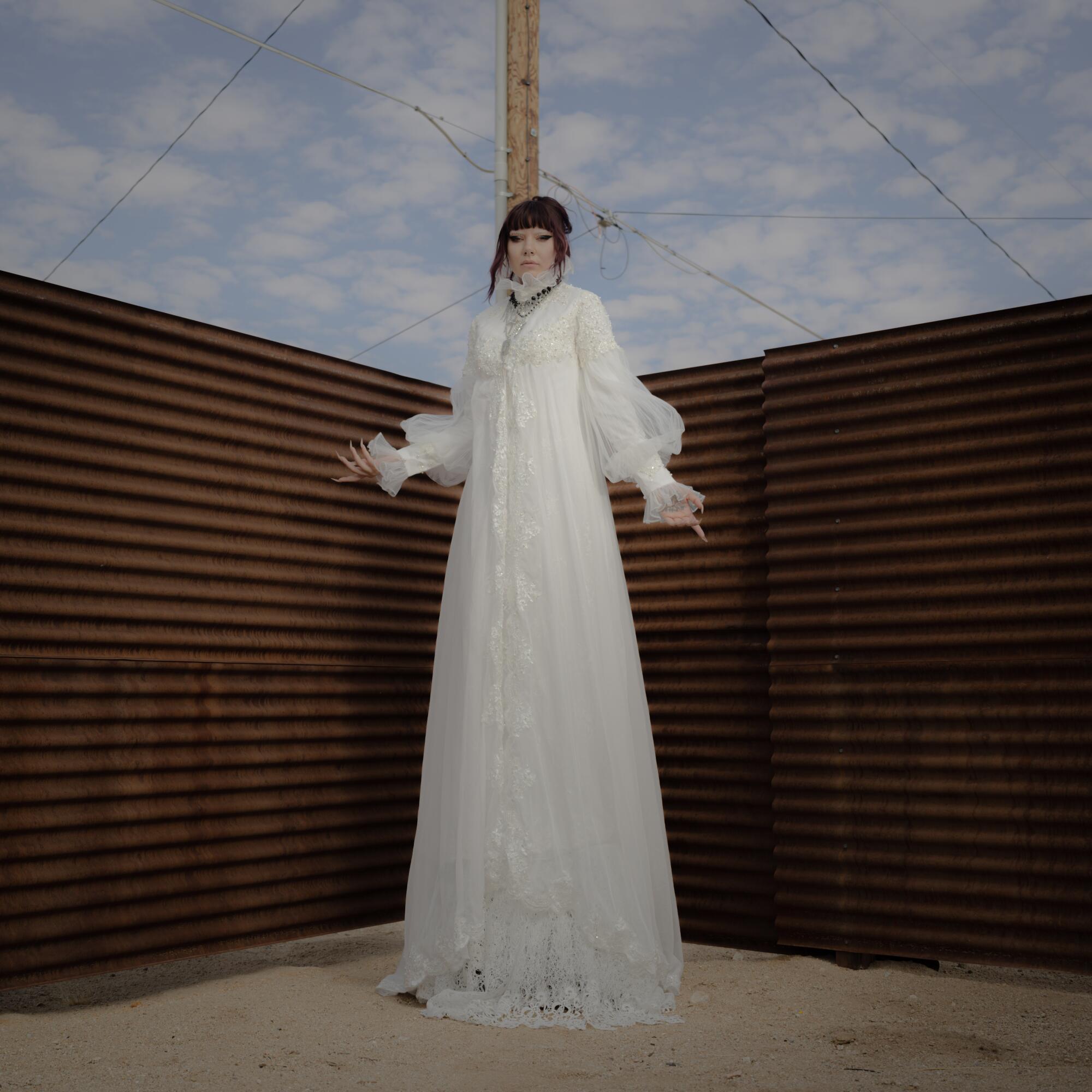The El Paso-born artist spoke with The Times about how Robert Eggers and Catholicism inspired her new album, “And You Who Drowned in the Grief of a Golden Thing”
King Mala wants to put it all out there. And she is — at a breakneck pace.
The 26-year-old alt-pop singer released her (positively) nightmare-inducing debut album, “And You Who Drowned in the Grief of a Golden Thing,” on May 2. Since then she’s been on the road, touring along the West Coast from Vancouver to Los Angeles in support of Canadian singer Lights. After her recent appearance with Lights at the Roxy, King Mala will return to L.A. for her own headlining show at the Troubadour on June 26.
When joining a Zoom call with The Times, King Mala, whose real name is Areli Castro, admitted to running on fumes. Having just driven from Portland, Ore., to Seattle in the wee hours of the morning, Castro was contending with a central theme of her album in real time: the chasm between her dreams and the limits of her corporeal form.
“There’s this struggle between the things you want and the things you are,” said Castro. “I just love the idea of playing with grandeur and gods while still maintaining a very like human and gross and visceral vibe.”
Despite it all, she’s maintained a sunny disposition — a stark departure from the moody and dramatic feel of singles like “Ode to a Black Hole.” The macabre visuals from her current musical era evoke the same mystical energy as “True Detective” and 2024’s surprise horror hit, “Longlegs.”
Born in the border town of El Paso to a Mexican father and Puerto Rican mother, the musician grew up attending Catholic church and listening to a lot of soul music, a genre she now describes as her “bread and butter.” While she doesn’t feel stereotypically Texan, Castro still feels spiritually yoked to El Paso.
“El Paso is very, very non-Texas,” Castro said. “When I go to the rest of Texas, I’m like, ‘This isn’t my Texas.’ I grew up on [the] border — Southwestern vibes — and it’s so different than Austin or Dallas. I feel like a desert witch.”
That desert witchiness emanates from the mesmerizing sonic loops and negative space deployed in her songs, which she pairs with “found” footage inspired by ghost hunting shows, ornate Catholic crosses and sandy landscapes captured in her music videos.
Castro also spoke with The Times about how she mapped out her debut album and the life experiences that helped shape her gothic sensibilities.
This interview has been edited and shortened for clarity.
When it comes to the aesthetics of the album, it employs a lot of religious aspects. What was the intention with that?
I love religious metaphor. I find it so grand and ancient and fun to use as a vehicle to tell a story. I’m very obsessed with the collective unconscious and how we keep telling the same stories over and over and over. So using stories that I really admire as the vehicle for this was really fun. There’s just a power struggle in this album that I wanted to capture. And it felt like using the metaphor of God and humanity and of, “How do you exist as a powerful person, while also still maintaining your humanity?” That was the whole point of the album.
Does that attraction to religion and these grand ideas come from your own habit or was it a thing from when you were growing up that influenced you?
I grew up very Catholic, like cradle Catholic. My grandma always wanted us to go to Mass, so we adhered to that. But I was home schooled and the home school community is very Christian. And so I was sort of indoctrinated into that for a good amount of my formative years — middle school [and] early high school. It was very harmful and strange.
It was very interesting to see how predatory the religion is. It’s looking for kids who are lonely and scared and promising solace, which is nice, but then there’s always a backhand that’s like, “Oh, but you have to do this and you have to adhere to this and you have to follow our rules.”
Yeah, I’ve got a little bit of religious trauma to say the least. … Once I was out of that cycle and community, I realized it’s really all very similar to a cult. At what point does a cult transition into just a full religion? Is it just enough people believe it? I don’t know. So that was a bunch of the stuff that I was thinking about as we made this.
What are some media that you draw inspiration from?
I’m a big, big, big horror girlie. So that was a big inspiration. I love that being a human is so gross and I feel like we don’t realize that half the time because we’re so used to it. I love body horror. I love [movies like] “The Substance” and “The Witch.” I’m very obsessed with Robert Eggers and the way he makes beautiful, beautiful horror.
Going into [the album] I wanted to do it the way we did humanity. I wanted it to be very gross and visceral and real and if we were going to do sexy, I wanted it to be very raw. And if we were going to do body horror, I wanted it to be very intentional and intense.
Do you feel like the grossness of being human is kind of beautiful?
I love it. We’re so weird, especially our relationships to each other. It’s so sweet and strange and we love to hold hands and touch our mouths together. It’s so cute and gross and funny. I love thinking of us like we’re aliens. Like if some other creature saw us, they’d be like, “What the f— are they doing?” It’s really funny.
Are there musical acts that you drew inspiration from for this album?
For this record, we drew a lot of inspiration from “22, a Million” by Bon Iver, from Radiohead, from old school hip hop and rap. Kendrick Lamar and old Kanye West … We had a big playlist. Phantogram was on there, The xx is on there, Portishead, Little Simz — she was a big inspo — Doechii, Rico Nasty.
I was drawing from a bunch of different directions. [The production team] knew we had to create this sonic landscape before we started making the record. We wanted to do analog drums and hip-hop beats with reverbed-out, textural guitar, à la Mk.gee. We just wanted it to feel alive and analog.
What do you want people to get out of your live show?
I want people to ascend and join the character. I want it to feel like a movie. I want these songs to live and breathe and sort of experience themselves through everyone in the audience. I think live shows create like such an energy between people. I want it to feel like we’re going to church, like we’re going on a journey together. That’s the goal.




